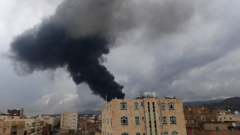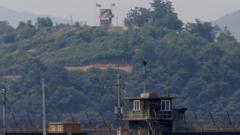Intense bombardment by Israeli forces has left one million Palestinians in Gaza City in a precarious situation, with significant casualties and dwindling humanitarian resources.
Intensifying Israeli Assault on Gaza City Raises Concerns for Civilians

Intensifying Israeli Assault on Gaza City Raises Concerns for Civilians
Israel expands military operations in Gaza City as humanitarian crisis deepens, sparking fears for the safety of its residents.
As the conflict escalates, airstrikes and ground operations have surged in key areas of Gaza City, increasing the toll on a beleaguered population virtually surrounded by warfare. Recent reports confirm an alarming rise in casualties, with Israeli attacks resulting in the deaths of 64 individuals and injuries to nearly 300 in just 24 hours, according to Hamas’ health ministry. This comes against the backdrop of a devastating cumulative death toll that has reached over 62,000 since Israel's military campaign began after a deadly Hamas attack on October 7, 2023, which claimed 1,200 Israeli lives and left numerous others captured as hostages.
Israeli Prime Minister Benjamin Netanyahu remains steadfast in his resolve to defeat Hamas, despite facing growing international criticism and domestic pressure from families of hostages. With the announcement of the intention to occupy the entire Gaza Strip following stalled ceasefire negotiations, tensions have soared. In preparation for a planned offensive, Israel has drafted 60,000 reservists, indicating a significant military escalation on the horizon.
Recent bombardments have particularly affected the Zeitoun, Shejayia, and Sabra neighborhoods, with tank strikes and air raids being described as constant by local residents. The Israel Defence Forces (IDF) have returned to the Jabalia refugee camp area, claiming that military presence is necessary to thwart Hamas operations and expand territorial control.
The World Health Organization has also reported the release of one of its staff members who was detained by the IDF since July, though details surrounding the detainment remain sparse.
As negotiations for a ceasefire led by mediators from Qatar and Egypt have reached an impasse, calls for peace grow louder. Although a proposal for a 60-day truce and partial hostage release was extended by Hamas, Israeli officials have dismissed it, insisting on a comprehensive resolution. The humanitarian situation is increasingly dire, with the UN noting that over 90% of homes in Gaza are damaged or destroyed, health facilities have collapsed, and conditions of famine have arisen for the first time in the region.
With Gaza’s infrastructure in ruins and a looming military operation, the potential for catastrophic humanitarian outcomes is severe, prompting urgent appeals for international intervention.
Israeli Prime Minister Benjamin Netanyahu remains steadfast in his resolve to defeat Hamas, despite facing growing international criticism and domestic pressure from families of hostages. With the announcement of the intention to occupy the entire Gaza Strip following stalled ceasefire negotiations, tensions have soared. In preparation for a planned offensive, Israel has drafted 60,000 reservists, indicating a significant military escalation on the horizon.
Recent bombardments have particularly affected the Zeitoun, Shejayia, and Sabra neighborhoods, with tank strikes and air raids being described as constant by local residents. The Israel Defence Forces (IDF) have returned to the Jabalia refugee camp area, claiming that military presence is necessary to thwart Hamas operations and expand territorial control.
The World Health Organization has also reported the release of one of its staff members who was detained by the IDF since July, though details surrounding the detainment remain sparse.
As negotiations for a ceasefire led by mediators from Qatar and Egypt have reached an impasse, calls for peace grow louder. Although a proposal for a 60-day truce and partial hostage release was extended by Hamas, Israeli officials have dismissed it, insisting on a comprehensive resolution. The humanitarian situation is increasingly dire, with the UN noting that over 90% of homes in Gaza are damaged or destroyed, health facilities have collapsed, and conditions of famine have arisen for the first time in the region.
With Gaza’s infrastructure in ruins and a looming military operation, the potential for catastrophic humanitarian outcomes is severe, prompting urgent appeals for international intervention.

















